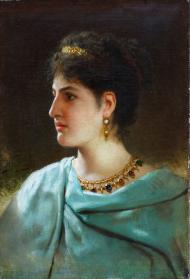누가 체니스와 데이트 했나요?
Vespasian 날짜가 체니스 일 때 ?에서 ?. 까지
체니스

체니스(그리스어:Caenis: ??? ~ 74년)는 로마 제국의 황제 베스파시아누스의 정부이다.
과거 로마 시대에 노예 서녀로 로마 황제 티베리우스의 처형인 안토니아 미노르의 개인 비서로 일하던 중 베스파시아누스의 정부가 되었으며 안토니아의 배려로 자유의 몸이 되었다. 그녀는 그 후 베스파시아누스가 황제가 될 때 그와 결혼하여 황후의 신분으로 승격했다.
더 알아보기...Vespasian

Vespasian (; Latin: Vespasianus [wɛspasjˈaːnus]; 17 November AD 9 – 23 June 79) was Roman emperor from 69 to 79. The last emperor to reign in the Year of the Four Emperors, he founded the Flavian dynasty, which ruled the empire for 27 years. His fiscal reforms and consolidation of the empire brought political stability and a vast building program.
Vespasian was the first emperor from an equestrian family who rose only later in his lifetime into the senatorial rank as the first of his family to do so. He rose to prominence through military achievement: he served as legate of Legio II Augusta during the Roman invasion of Britain in 43, and later led the suppression of the Jewish rebellion of 66–70.
While he was engaged in the campaign in Judaea, Emperor Nero died by suicide in June 68, plunging Rome into a year of civil war known as the Year of the Four Emperors. After Galba and Otho perished in quick succession, Vitellius became emperor in April 69. The Roman legions of Egypt and Judaea reacted by declaring Vespasian, their commander, the emperor on 1 July 69. In his bid for imperial power, Vespasian joined forces with Mucianus, the governor of Syria, and Primus, a general in Pannonia, leaving his son Titus to command the besieging forces at Jerusalem. Primus and Mucianus led the Flavian forces against Vitellius, while Vespasian took control of Egypt. On 20 December 69, Vitellius was defeated, and the following day Vespasian was declared emperor by the Senate.
Little information survives about the government during Vespasian's ten-year rule. He reformed the financial system of the Roman Empire after the campaign against Judaea ended successfully, and initiated several ambitious construction projects, including the building of the Flavian Amphitheatre, better known today as the Colosseum. Through his general Agricola, Vespasian increased imperial expansion in Britain. Vespasian is often credited with restoring political stability to Rome following the chaotic reigns of his predecessors. After he died in 79, he was succeeded by his eldest son Titus, thus becoming the first Roman emperor to be succeeded by his natural son and establishing the Flavian dynasty.
더 알아보기...